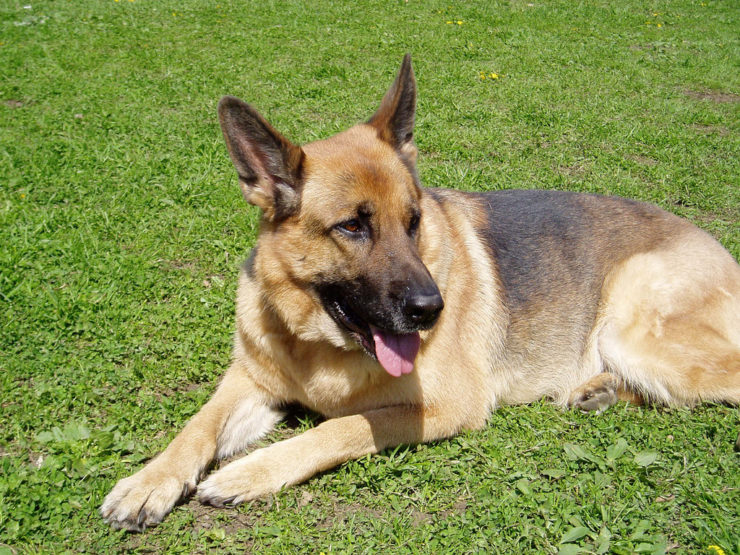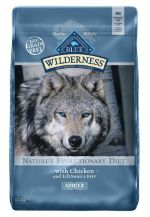Linda A: What can I give my German Shepherd to stop her diarrhea?
My German Shepherd has been pooping diarrhea for 3 days now. She is eating OK. I feed her dry food only. The poop has slimy (sorry so graphic) in it and it smells sssoooo bad I have to hose the yard everytime she goes.

Photo Credit: 2Tales/Flickr CC
Answers and Views:
Answer by silver wings
Good, she is still active. Try a bland diet.
Answer by King Les The Lofty
You need to know whether it is parvovirus, or a milder gastro-enteritis, or giardia, or worms, or what.
You need to check whether she has reached the dehydration stage.
You need to KNOW these things, not just guess.
The first treatment for any diarrhea is to rest the stomach for 24 hours - supply water but no food except maybe some natural yogurt (natural yogurt helps to recolonize the GOOD gut bacteria that get lost during diarrhea or during dosing with antibiotics). But as she has been squirting for 3 days she is beyond that, she needs medical assistance to get rid of the cause of her diarrhea plus to help her recuperate from its effects and, as I said, she needs checking for dehydration. The pinch test lets you know whether to panic or to just keep worrying:
(1) Take the scruff of her neck between finger & thumb and lift as high as it will go.
(2) Let go and start counting.
The scruff SHOULD instantly fall back into its proper position. If your count reaches 3 or higher then your bit.ch is in serious trouble and you ring the duty vet, state how long it took for the scruff to retract, and say that you're on the way to the clinic. She will probably need a couple of days on an IV drip and antibiotics and may need subcutaneous injections of fluids before going onto the drip.
Are you aware that dehydration is the biggest killer of human babies? And that diarrhea is the cause of the dehydration?

Blue Buffalo Wilderness Grain Free Dog Food on Amazon (#ad)
Answer by Socion
Treat your German Shepherd for the first 12-24 hours by withholding food and water. After 12 hours, you can offer ice cubes or 1-2 ozs. of Gatorade or distilled water (in case the tap water has the contaminants). If this is handled well, you can advance to the small meal. If vomiting or diarrhea continues during withholding of food and water and is longer than 24 hours, seek veterinary help. When advancing to a small meal, this should be rice with lean, cooked, drained, meat; the ratio is 75% rice to 25% meat. Alternatively, you can offer baby cereal (cream of rice or cream of wheat) and some cooked egg. Avoid fatty foods and do not give milk with diarrhea. After 72 hours, gradually reintroduce regular food by mixing with the mixture. After a first small meal, gradually work up to giving the same amounts of the mixture as the dog is used to receiving at normal meals. A sudden change from a bland diet to regular dog food may precipitate a new bout of vomiting/diarrhea. When traveling, baby food rice cereal and baby food meat is more readily available. At this stage, water should be continually available, but only in small amounts at a time.
You can give Pepto Bismol or Imodium AD, for diarrhea - (1/2 a 2mg tablet for a 20-30 lb. dog, 2-4x day max at 4-6 hour intervals for dogs, 1/8-1/4 if a tablet or 1ml of the liquid for a 10 lb. cat; if liquid medication, use a syringe inserted in the side of the mouth ).
One word of caution using Imodium…if there is any vomiting, no diarrhea, or the pet is acting sick, not just having the squirts, be careful using this drug. Imodium acts by slowing to stopping the movement of the gut. If there are a lot of toxins from bacteria or spoiled foods, then this material sits in the intestines and is more likely to enter the bloodstream and make your dog sicker. If there is no diarrhea, just vomiting, you may actually constipate your pet. But if you are traveling or at home, and your pet develops diarrhea and still feels fine, this is a wonderful thing to have on hand.
Wellness CORE Natural Grain-Free Dry Dog Food
If your pet passes frequent liquid or semi-liquid motions it may be ill with a minor infection but could be something more serious. If the dog seems well aside from diarrhea, withhold food and water as scheduled above. If acute signs are also present (the feces are bloody, vomiting, the pet seems dull and depressed) seek veterinary help.
- How long should diarrhea last after the change of food?
- What should i give to my puppy who has diarrhea?
- What can I do to help my chihuahua with diarrhea?
If your German Shepherd has more than one isolated bout of vomiting &/or diarrhea, the first step towards treatment is to NPO him for 24 hours. This means nothing given orally, food or water. He can have some ice cubes to lick on, as they will provide fluids in extremely small amounts. After there has been no additional vomiting, start back on small amounts of water (Pedialyte is OK), a few laps at a time, every 1-2 hours. If he continues to keep this down over the next 6 hrs, gradually increase the volume in one sitting. After keeping water down for 12 hrs, you can start back on small amounts of bland foods. These include cottage cheese, boiled rice, boiled chicken, lean browned ground turkey with the fat washed off, oatmeal, scrambled egg, or prescription diets like I/D. Start with 1-2 tablespoons every 2 hours. After 6 hrs, increase in volume and decrease the intervals. A good goal for a 20 lb animal is 1/3 cup every 4-6 hours. If food stays down the next 24 hrs, feed up to 1/2 cup in 3 meals over the next 2 days. Start adding back a regular diet mixed with bland foods. If vomiting or diarrhea persists or if you see blood-seek veterinary attention immediately.
It should take about 5 days to get your German Shepherd back on regular food. Some pets take a little longer, depending on how irritated the gut was to start. If the vomiting/diarrhea continues longer than 24 hrs of NPO, if there is any blood, multiple episodes of vomiting (over 3-4) occur in a short time (30-45 mins), or if the pet is depressed or lethargic, then seek veterinary attention. Young pets less than 6 mos and older pets over 7 years are more likely to dehydrate quicker, so may need medical attention sooner, especially if there is an underlying disease, such as diabetes, kidney disease, etc. Most of the time, minor GI upsets will heal themselves if the gut is allowed to rest.
Know better? Give your own answer to this question!

Dorian says
My German Shepard is 9 weeks old and he liquid poop every time I walk him but he is still very active and he eats and drink water. I need help with some remedies
Mark says
First of all, try to determine the cause. It may be worms (did you deworm your pup ?). It may be low-quality food or the change of food. Reduce the amount of food to a minimum. If he is too hungry give him some rice with boiled chicken.
Dorian says
it’s been about 4 days since I gave him the deworm
Mark says
Good. Then it’s probably the food. If he still has diarrhea a few days after putting him on a strict diet, it’s better to consult the vet.
Arpit says
My German shepherd is around 9 months old and from last two days he is not having his meal property and he do vomiting after half hour of meal plz suggest me remedies
RussianDog says
If it lasts for two days you better show your GSD to the vet. Occasional vomiting happens to any dog but recurring vomiting may signal of a serious problem.
Pooja says
Yesterday I brought 1 month old German shepherd who is frequently doing liquid potty. I only gave her milk and chapati.? What is the reason for this?
RussianDog says
The puppy is too small. The breeder shouldn’t have sold you a puppy before it is 2 months old. Is the puppy dewormed? It’s a good idea to show it to the vet and follow recommendations.